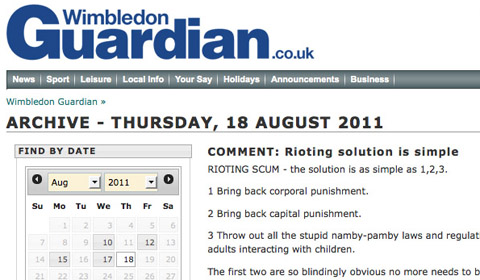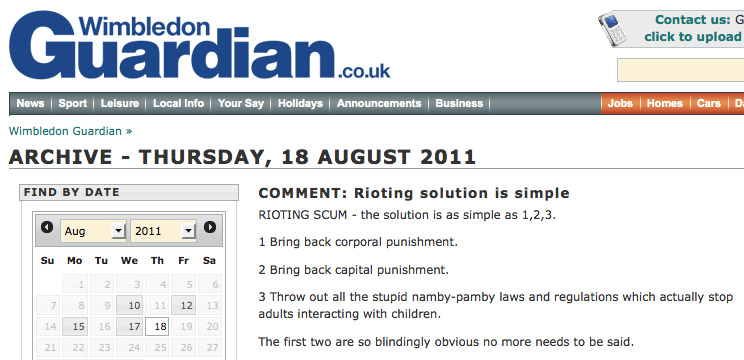Newsquest journalists are not exactly being encouraged to use Twitter and other social media, according to the company’s new social media policy sent to employees today (9 August).
The policy advises “the internet is provided primarily for business use” but the company recognises “employees participate in social networking on websites such as Facebook, Twitter, MySpace, Bebo and Friendster”. No kidding.
It seems a pretty standard policy for local newspapers, such as one I seem to remember Johnston Press sending out when I worked for the company a couple of years ago. JP even went as far to ban the use of mobile phones in the office, resulting in most reporters quietly ignoring the rule for the sake of gathering stories.
The statement shows the company fails embrace the power of social media as a source or for traffic referral. The statement should be reassuring both journalists and sales teams that they don’t need to hover their mouse over the minimise icon of Tweedeck in case the editor walks by.
Newsquest’s statement does state “exceptional circumstances may apply” when journalists can use social media for “editorial research”.
Presumably any Newsquest journalist reporting on the riots may be permitted to look at Twitter today. But what about checking the WI’s Facebook page for details of the next coffee morning? Could you argue the case as exceptional? Hardly encouraging, is it?
And where the social media policy is restrictive, it is not helpful in offering guidance. How about “don’t tweet anything you wouldn’t say if representing the company on the radio” or “be sensible in your use of social media”?
Newsquest’s full social media policy is below. Presumably whoever wrote it is unaware that they are using the Twitter standard of asterisks to denote *emphasis*.
UPDATE: Newsquest has responded explaining that this social media policy is better described as “some HR ‘acceptable use’ advice.
Roger Green, managing director of digital media at Newsquest, sent a statement explaining the company has a ‘social media best practice for journalists’ document available on its wiki.
Our social media best practice guidelines have been promoted in a number of well-attended training workshops run over the past few months by my heads of editorial and audience development. The most recent of these was just three days ago in Basildon where it was stressed that the effective use of social media is part & parcel of modern journalism.
These promotional efforts, along with the energy and enthusiasm of Newsquest journalists have generated a growing number of cutting-edge story-telling successes.
A leaked copy of the guidelines on personal use of social media:
*Hard copies of this Policy are on the notice boards.*
* *
*SOCIAL NETWORKING POLICY*
*PURPOSE*
This policy on social networking websites is in addition to the
Company’s existing policy on email and internet use.
As employees are aware, the internet is provided primarily for
business use. The Company recognises that many employees use the
internet for personal purposes and that many employees participate in
social networking on websites such as Facebook, Twitter, MySpace, Bebo
and Friendster.
The purpose of this policy is to outline the responsibilities of
employees using the internet to access social networking website,
which are not limited to the named sites above and include
photo-sharing sites, blogs, web forums and other associated websites.
*USE OF THE INTERNET*
The Company permits employees to access social networking websites on
the internet for personal use during certain times. These times are:
* before and after work hours; and
* during the one-hour break at lunch.
The Company reserves the right to restrict access to these websites.
The Company permits employees to access social networking websites on
the internet for business use as and when required providing this use
has a positive impact on the employee’s work and does not interfere
with the employee’s primary job responsibilities.
*PERSONAL CONDUCT*
The Company respects an employee’s right to a private life. However,
the Company must also ensure that confidentiality and its reputation
are protected. It therefore requires employees using social networking
websites to:
* refrain from identifying themselves as working for the Company;
* ensure that they do not conduct themselves in a way that is
detrimental to the employer; and
* take care not to allow their interaction on these websites to
damage working relationships between members of staff, advertisers
and clients of the Company.
*Business Use – Exceptional Circumstances*
Exceptional circumstances may apply, where in a work capacity, an
employee may identify themselves as working for the company which are
as follows:
· In promoting a Company event linked to one of the Company products
· Through one of the Company’s products social networking pages
· Editorial research
In these circumstances, employees are responsible for representing the
company in a professional manner.
All employees should ensure that any personal blogs and other personal
posts contain disclaimers that make it clear that the opinions
expressed are solely those of the author and do not represent the
views of the company.
Employees are not permitted to write recommendations or referrals on
social networking sites in relation to the Company.
Employees should not make reference to any customers, advertiser or
staff without obtaining their express permission to do so.
In any event, employees should at all times comply with the law in
regard to copyright and plagiarism.
*MONITORING OF INTERNET ACCESS AT WORK*
The Company reserves the right to monitor employees’ internet usage,
but will endeavour to inform an affected employee when this is to
happen and the reasons for it. The Company considers that valid
reasons for checking an employee’s internet usage include suspicions
that the employee has:
* been spending an excessive amount of time viewing websites that
are not work-related; or
* Use of the internet for personal use during working hours
* acted in a way that damages the reputation of the Company and/or
breaches commercial confidentiality.
The Company reserves the right to retain information that it has
gathered on employees’ use of the internet for a period of one year.
*SECURITY AND IDENTITY THEFT*
Employees should be aware that social networking websites are a public
forum, particularly if the employee is part of a “network”. Employees
should not assume that their entries on any website will remain
private. Employees should never send abusive or defamatory messages.
Privacy and feelings of others should be respected at all times.
Employees should obtain the permission of individuals before posting
contact details or pictures. Care should be taken to avoid using
language which could be deemed as offensive to others.
Employees must also be security conscious and should take steps to
protect themselves from identity theft, for example by restricting the
amount of personal information that they give out. Social networking
websites allow people to post detailed personal information such as
date of birth, place of birth and favourite football team, which can
form the basis of security questions and passwords. In addition,
employees should:
* ensure that no information is made available that could provide a
person with unauthorised access to the Company and/or any
confidential information; and
* refrain from recording any confidential information regarding the
Company on any social networking website.
*MANAGING THE POLICY*
If information on the site raises a cause for concern with regard to
conflict of interest, defamation or any other breach of the Social
Networking Policy, employees should raise the issue with their line
manager.
If occasion arise of what might be read to be online bullying or
harassment, these will be dealt with in the same way as other such
instances under the Equal Opportunities and Dignity at Work policy.
*DISCIPLINARY ACTION*
Non-compliance of the Social Networking policy or in instances where
the Company is brought into disrepute as a result of non-compliance
may constitute misconduct or gross misconduct and disciplinary action
will be applied. Please refer to the Company’s Disciplinary Policy.


